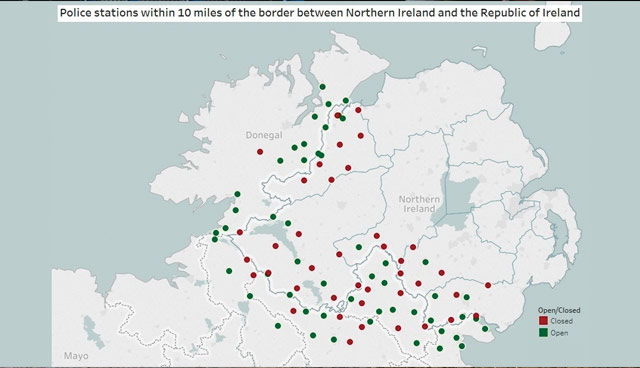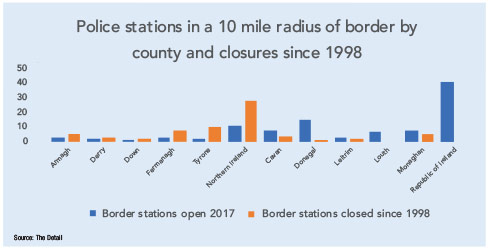Policing the border: station numbers reduced


Since 1998, 72 per cent of PSNI border stations have been shut, raising questions as to whether sufficient resources exist in the border region to police any change to the current status quo.
In January 2018 both Chief Constable George Hamilton and Detective Chief Superintendent Tim Mairs appeared before a House of Lords Select Committee on the European Union and voiced concerns around the potential impact that Brexit could have on policing the border.
The senior PSNI officials addressed a number of issues including the threat of increased political violence, levels of fuel smuggling and increased levels of border crime such as burglary.
Simplifying their concerns, Mairs stressed to the committee: “If one applies the worst-case scenario of a no-deal situation, we are potentially in the region of 13 months away from the Police Service of Northern Ireland effectively managing a 300-mile land border with the European Union.
“From our perspective, 13 months is not a lot of time in which to prepare or plan.”
Recent figures attained by The Detail highlight that across Ireland, more than 40 per cent of police stations within a 10-mile radius of the border have been closed since the Good Friday Agreement.
Out of the 92 stations recorded in 1998, both north and south, 52 now remain, many of which are part-time or have limited opening times to the public.
The majority of these closures have taken place in Northern Ireland, with 28 stations run by either the PSNI or the former RUC, compared to 12 Garda stations in the Republic of Ireland.

Currently just 11 PSNI stations remain operational within a 10-mile radius of the border, a 300 mile stretch, compared to 41 Garda stations. None of the 11 stations in Northern Ireland operate on a 24-hour basis.
The PSNI Chief Constable has already outlined that a ‘hard’ border would increase the likelihood of paramilitary activity, while others have outlined the potential for greater levels of criminal activity if regulatory alignment is not achieved for both jurisdictions.
While it is difficult to see how any change to the current border status would not require an increased police presence in the surrounding vicinity, Chief Constable Hamilton has indicated that he is not considering increasing PSNI border infrastructure.
He told the House of Lords Committee: “In terms of putting hard infrastructure in place to police the border, we have somewhere towards 300 miles of border. When we tried to police that, from a security perspective, during the period of the Troubles, it was not particularly successful.
“There was lots of very hard infrastructure built that became the target of attack. It led to predictability around resource deployments in and out of it. At that stage, the police organisation on the northern side, the Royal Ulster Constabulary, was about 13,000 strong; we are now fewer than 7,000. On top of that, we had several thousand soldiers. None of this led to an entirely satisfactory or successful policing of the border in the policing and security sense.
“We have a pretty strong evidence base from what went before to tell us that that is not going to work anyway, so why would we invest in that?”
Hamilton went on to admit that the PSNI have been “too sensitive” about straying into the political sphere when raising their concerns around the border.
“We are trying to be very careful and sensitive about not offering a political view, but it is legitimate for the police to identify operational consequences and, therefore, mechanisms that need to be put in place to replace the current EU-sponsored arrangements. My concern is that we have been treading carefully so as not to move into what is a political debate, but we also feel a certain lack of assurance, in that we are saying the same things now that we were saying 18 months ago.”
He added: “Other than us flagging up what the issues are and asking for alternative arrangements to be put in place, we feel that we are treading water a little. As part of that, perhaps we are too sensitive about not straying into the political space.”
Asked directly whether the current facilities would be suitable to police a hard border and whether a contingency plan exists in relation to policing stations on various Brexit scenarios, the PSNI says they do not make distinction in the service they provide to any community, irrespective of geographical location.
Superintendent Simon Walls added: “Policing is not about buildings, it is about people…the reality is that nearly all policing services are delivered outside of stations. Over the past five years, two police stations (Aughnacloy and Castlederg) within a 10-mile radius of the border have closed as part of the ongoing review of our estate.
“The review of our estate continues as we work with partners to tackle criminality across Northern Ireland. Policing is a 24 hours, seven days a week operation and our estate does not influence our commitment to responding to requests for help from our community. Fewer people are visiting or using police stations and the public are increasingly engaging with us in different ways.
“Our policing purpose is and will remain the same – keeping people safe.”





